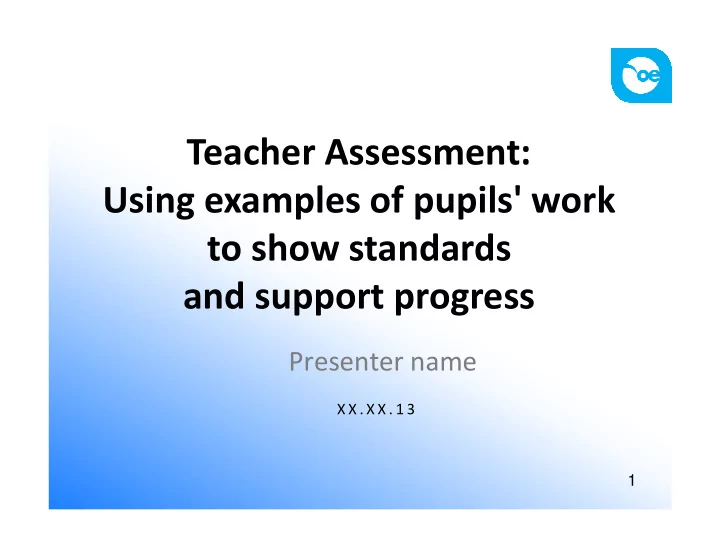

Teacher Assessment: Using examples of pupils' work to show standards and support progress and support progress Presenter name X X . X X . 1 3 1
Training session 0 Leading training sessions 2
Purposes and outcomes What do you want the purposes and outcomes of your moderation meetings to be? to be? Take a moment to reflect on your personal view. 3
What do we currently achieve? (1) How well do your moderation meetings currently help you and your colleagues to: be confident in using formal, public • assessment criteria? be accurate and consistent in our summative be accurate and consistent in our summative • assessments? share and develop ideas about how to teach • certain topics, concepts and skills? share and develop ideas about how to use • assessment formatively? 4
What do you currently achieve? (2) How well do your moderation meetings currently help you and your colleagues to: work together in planning, teaching and • assessing? collect examples of work to show your pupils collect examples of work to show your pupils • what they can aim for and how to go about it? collect examples of work to inform everyone • in your school, colleagues elsewhere, partners, inspectors and visitors about your teaching and your pupils’ learning? 5
Comparing ideas In pairs (or threes) read the quotes in Handout 0.1 and discuss what colleagues elsewhere said about moderation in their schools. What do you agree with? • What are you unsure about? What are you unsure about? • Is there anything you would add? • Is there anything that particularly interests • you? 6
A possible dilemma Read Handout 0.2 . Assessing in lessons, you tend to want to keep your pupils all together. your pupils all together. Assessing to give levels or grades, you have to separate your pupils. Do you agree? If so, how can you handle that tension? 7
Summing up so far... What do you believe are the essential: • pre-conditions • purposes and outcomes ... for moderation in your team and school? Discuss as a pair (or three). Be ready to share your ideas with the whole group and work towards agreeing two collective statements. 8
Agreed statements These are necessary pre-conditions for effective moderation meetings: ………………………………… • ………………………………… • ………………………………… ………………………………… • We want the purposes and outcomes of our moderation meetings to be that: …………………………………… • …………………………………… • …………………………………… 9 •
Running moderation meetings How do you run moderation meetings so that everyone benefits from differing points of view? Reflect on your own for a few moments. What has been good, and what not so good, • about moderation meetings you have experienced? 10
Facilitating differences In pairs (and a three if necessary), pick out some of the implications of what you read in Handout 0.3 . What helps individuals in a meeting to: listen to and learn from one another? listen to and learn from one another? • explore differences of view? • move towards consensus? • make fairness toward pupils and • consistency in using criteria priorities as objectives? 11
Guidance What guidance can we give ourselves about running moderation meetings? In pairs, draw up a list of ‘Dos’ and ‘Don’ts’ for In pairs, draw up a list of ‘Dos’ and ‘Don’ts’ for running moderation meetings. Write them on different coloured sticky notes. 12
Group summary Our reminders about running moderation meetings: Do: …………………………………… …………………………………… Don’t: …………………………………… …………………………………… 13
Preparation for Training session 1 What do you need to do to prepare for Training session 1? In small groups, review the materials for Training session 1. What are the strengths of the approach and • materials? What questions do you want answers to? • Be ready to discuss with the whole group: what you think is positive about the materials • what needs to be clarified. • Record decisions where appropriate. 14
Organising the sessions • Do you want to have a pilot subject taking the training first, then other subjects following? • Or would you prefer to train several subjects in parallel? • What preparations need to be made – and who will What preparations need to be made – and who will make them? • How will you stay in touch as a group? • How will you inform senior leaders and others about the progress you make through the training? • Are there other implications you need to consider at 15 this stage?
Evaluation How effective was this session for you? Be ready to share reflections as a group. What has gone well in this session? What has gone well in this session? • Are there any matters to follow up? • 16
Recommend
More recommend